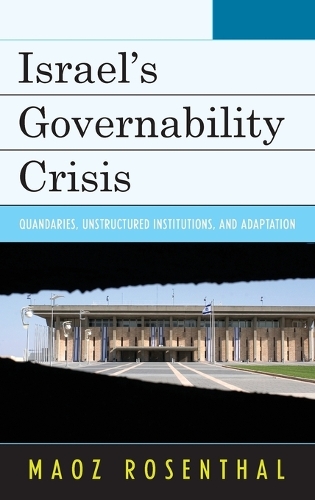
Israel's Governability Crisis: Quandaries, Unstructured Institutions, and Adaptation
(Hardback)
Publishing Details
Israel's Governability Crisis: Quandaries, Unstructured Institutions, and Adaptation
By (Author) Maoz Rosenthal
Bloomsbury Publishing PLC
Lexington Books
22nd November 2016
United States
Classifications
Professional and Scholarly
Non Fiction
Political ideologies and movements
Political structure and processes
327.5694
Physical Properties
Hardback
162
Width 157mm, Height 239mm, Spine 18mm
404g
Description
This book examines the governability crisis faced by Israeli governmental institutions. For a long period of time, observers of Israels government have reported the same phenomena: instability in most political positions not allowing for proper policy design, enhanced control of the bureaucracy over the policy making process, and complete uncertainty regarding the implementation of policies by the bureaucracy. However, while one expects that with such a toxic combination of all the wrong policy making components Israel would collapse, Israel has been able to achieve quite impressive landmarks in its overall performance. During the first decade of the 21st century, Israel became an OECD member and enjoyed high growth when the world was facing stagnation and economic collapse. Israels government, which regularly faces quandaries in a variety of policy fields, is able to initiate large scale policies when needed. Yet, this same government refrains from initiating large-scale reforms in institutional structures. Hence, for analysts of political institutions, the Israeli state of affairs is one of choice: while initiating changes to reform and overhaul the Israeli institutional system is possible it is also perilous. To cope with that duality Israeli political leadership on all sides has developed a variety of mechanisms that allow them to provide the policy output needed so as to maintain the status-quo. This book examines these mechanisms as they exist in different facets of government work and explains their output and persistence. Examples include coalitional making and breaking, the ways in which ruling coalitions maneuver in parliament, and policy design and implementation.The book also explores the problem that exists in Israels governability: the lack of a strategic high-order far sighted decision making. Finally, it offers a method of electoral reform that can address both of these systemic maladies.
Reviews
This book examines. . . coalitional making and breaking, the ways in which ruling coalitions maneuver in parliament, and policy design and implementation. The book also explores the problem that exists in Israels governability: the lack of a strategic high-order far sighted decision making. Finally, it offers a method of electoral reform that can address both of these systemic maladies. * Israel Book Review *
The central question raised in this book is not only important but also intriguing. . . . Israels Governability Crisis is recommended for advanced political science and/or Israel Studies courses, not just for its close analysis of the Israeli political scene but also for its generalizability to other parliamentary regimes around the world. The author explicitly argues that Israels general approach to governance can serve as a foundation for analyzing other nations with similar systemic challenges, and I tend to agree with him. At the least, there is some small comfort in knowing that Israel is not alone in muddling through a political miasma. * Israel Studies Review *
In this excellent and innovative study, Rosenthal successfully develops an interdisciplinary approach to the study of governance which may prove useful for Israel studies students as well as for those engaging in pure comparative work within the subfield of public policy, governance and public law. -- Assaf Meydani, The Academic College of Tel-Aviv-Yaffo
Author Bio
Maoz Rosenthal is an assistant professor in the Inter-Disciplinary Center Herzliya.
